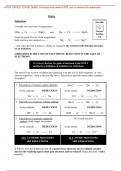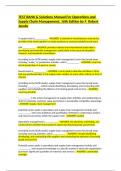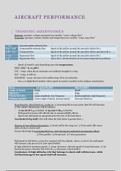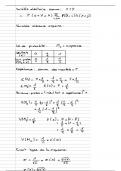A-PDF OFFICE TO PDF DEMO: Purchase from www.A-PDF.com to remove the watermark
Redox
Definitions See also
Consider two reactions of magnesium:- Chemical
Ideas
2Mg + O2 → 2MgO and Mg + Cl2 → MgCl2
Section
From the point of view of the magnesium, 9.1
both reactions are identical, i.e.,.... Mg – 2e– → Mg2+
...and, since the first reaction is clearly an oxidation, the reaction with chlorine must also
be an oxidation.
OXIDATION IS THE LOSS OF ELECTRONS: REDUCTION IS THE GAIN OF
ELECTRONS.
At A-level, the loss (or gain) of electrons is the ONLY
satisfactory definition of oxidation (or reduction).
The easiest way to show oxidation and reduction is by the use of ‘half equations’ or ‘ion-
electron equations’, such as that for Mg above. Electrolysis provides many other examples.
Examples:-
1. Electrolysis of molten sodium chloride 2NaCl → 2Na + Cl2
At the cathode:- REDUCTION At the anode:- OXIDATION
Na+ + e– → Na 2Cl– – 2e– → Cl2
2. Electrolysis of aqueous sodium sulphate 2H2O → 2H2 + O2
At the cathode:- REDUCTION At the anode:- OXIDATION
2H+ + 2e– → H2 4OH– – 4e– → 2H2O + O2
3. Electrolysis of aqueous copper(II) No overall reaction
sulphate (with copper electrodes)
At the cathode:- REDUCTION At the anode:- OXIDATION
Cu2+ + 2e– → Cu Cu – 2e– → Cu2+
ALL CATHODE PROCESSES ALL ANODE PROCESSES
ARE REDUCTIONS. ARE OXIDATIONS.
It follows from the definitions that if a species loses electrons and is oxidised, another
species (the oxidising agent) must gain electrons and be reduced. Hence the term, ‘redox
reaction’.
, GCSE definitions of oxidation and reduction include gain or loss of
oxygen and hydrogen. Although these are still useful indications of
oxidation and reduction, they are not absolutely reliable.
Think of gain or loss of oxygen and hydrogen as ‘symptoms’ of
Hot Tip oxidation of reduction, but be prepared to check that electrons have
been lost or gained, using ‘Oxidation States’ (see below).
Oxidation States
Oxidation states are best explained by examples.
Consider the reaction of vanadium with oxygen. Heating vanadium with oxygen gives a
mixture of V2O3, VO2 and V2O5.
V + 1½ O2 → V2O3 V + 2O2 → VO2 V + 2½ O2 → V2O5
All of these reactions are clearly oxidations of vanadium:-
1. Formation of V2O3 involves:- V – 3e– → V3+
2. Formation of VO2 appears* to involve:- V – 4e– → V4+
3. Formation of V2O5 appears* to involve:- V – 5e– → V5+
* VO2 and V2O5 cannot be pure ionic compounds. First, the ionisation energies (page 11) of
vanadium...
1st I.E. of V 2nd I.E. of V 3rd I.E. of V 4th I.E. of V 5th I.E. of V
648 kJ mol–1 1370 kJ mol–1 2870 kJ mol–1 4600 kJ mol–1 6280 kJ mol–1
...show that an impossibly large amount of energy would be needed to remove the fourth
and fifth electrons. Second, the charge densities (page 52) of V4+ and V5+ are so high that
these ions would immediately polarise the electron clouds of neighbouring oxide ions to
give covalent oxides.
Both VO2 and V2O5 are covalent, so how can vanadium be said to have “lost” electrons?
The answer is that it does not matter (for this purpose) whether the compounds are ionic
or covalent:-
V2O3 is vanadium(III) VO2 is vanadium(IV) oxide V2O5 is vanadium(V) oxide
oxide because it contains because it APPEARS to because it APPEARS to
V3+. 4+
contain V . contain V5+.
The number in Roman numerals (III, IV or V) is the oxidation number, which describes the
oxidation state of the element.
Redox
Definitions See also
Consider two reactions of magnesium:- Chemical
Ideas
2Mg + O2 → 2MgO and Mg + Cl2 → MgCl2
Section
From the point of view of the magnesium, 9.1
both reactions are identical, i.e.,.... Mg – 2e– → Mg2+
...and, since the first reaction is clearly an oxidation, the reaction with chlorine must also
be an oxidation.
OXIDATION IS THE LOSS OF ELECTRONS: REDUCTION IS THE GAIN OF
ELECTRONS.
At A-level, the loss (or gain) of electrons is the ONLY
satisfactory definition of oxidation (or reduction).
The easiest way to show oxidation and reduction is by the use of ‘half equations’ or ‘ion-
electron equations’, such as that for Mg above. Electrolysis provides many other examples.
Examples:-
1. Electrolysis of molten sodium chloride 2NaCl → 2Na + Cl2
At the cathode:- REDUCTION At the anode:- OXIDATION
Na+ + e– → Na 2Cl– – 2e– → Cl2
2. Electrolysis of aqueous sodium sulphate 2H2O → 2H2 + O2
At the cathode:- REDUCTION At the anode:- OXIDATION
2H+ + 2e– → H2 4OH– – 4e– → 2H2O + O2
3. Electrolysis of aqueous copper(II) No overall reaction
sulphate (with copper electrodes)
At the cathode:- REDUCTION At the anode:- OXIDATION
Cu2+ + 2e– → Cu Cu – 2e– → Cu2+
ALL CATHODE PROCESSES ALL ANODE PROCESSES
ARE REDUCTIONS. ARE OXIDATIONS.
It follows from the definitions that if a species loses electrons and is oxidised, another
species (the oxidising agent) must gain electrons and be reduced. Hence the term, ‘redox
reaction’.
, GCSE definitions of oxidation and reduction include gain or loss of
oxygen and hydrogen. Although these are still useful indications of
oxidation and reduction, they are not absolutely reliable.
Think of gain or loss of oxygen and hydrogen as ‘symptoms’ of
Hot Tip oxidation of reduction, but be prepared to check that electrons have
been lost or gained, using ‘Oxidation States’ (see below).
Oxidation States
Oxidation states are best explained by examples.
Consider the reaction of vanadium with oxygen. Heating vanadium with oxygen gives a
mixture of V2O3, VO2 and V2O5.
V + 1½ O2 → V2O3 V + 2O2 → VO2 V + 2½ O2 → V2O5
All of these reactions are clearly oxidations of vanadium:-
1. Formation of V2O3 involves:- V – 3e– → V3+
2. Formation of VO2 appears* to involve:- V – 4e– → V4+
3. Formation of V2O5 appears* to involve:- V – 5e– → V5+
* VO2 and V2O5 cannot be pure ionic compounds. First, the ionisation energies (page 11) of
vanadium...
1st I.E. of V 2nd I.E. of V 3rd I.E. of V 4th I.E. of V 5th I.E. of V
648 kJ mol–1 1370 kJ mol–1 2870 kJ mol–1 4600 kJ mol–1 6280 kJ mol–1
...show that an impossibly large amount of energy would be needed to remove the fourth
and fifth electrons. Second, the charge densities (page 52) of V4+ and V5+ are so high that
these ions would immediately polarise the electron clouds of neighbouring oxide ions to
give covalent oxides.
Both VO2 and V2O5 are covalent, so how can vanadium be said to have “lost” electrons?
The answer is that it does not matter (for this purpose) whether the compounds are ionic
or covalent:-
V2O3 is vanadium(III) VO2 is vanadium(IV) oxide V2O5 is vanadium(V) oxide
oxide because it contains because it APPEARS to because it APPEARS to
V3+. 4+
contain V . contain V5+.
The number in Roman numerals (III, IV or V) is the oxidation number, which describes the
oxidation state of the element.











